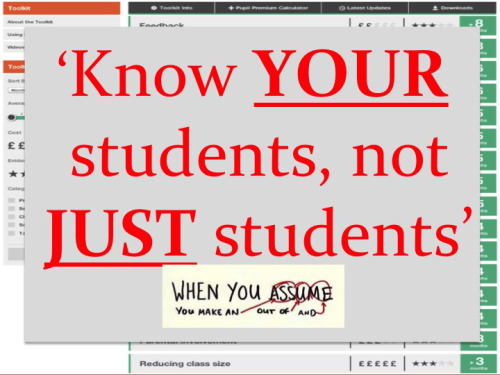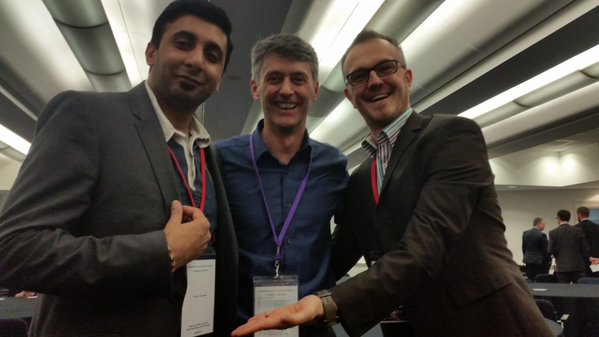
This excerpt is from a longer piece authored by Amjad Ali (@ASTSupportAAli), assistant headteacher at Cheney School – an SSAT member school. An account of his SSAT NC15 experience, it was originally posted on his own blog and he has kindly given us permission to share.
On Thursday the 3rd and Friday the 4th of December I attended @SSAT‘s (Schools, Students and Teachers Network) annual two day conference in Manchester. This year the theme was; Closing the gaps while raising the bar; Quality and Equity.
When my Head Teacher sent round an email to all members of SLT asking who would like to attend, I felt this was a no brainer, in my role as Director of Inclusion, I instantly replied saying, ‘Meeeeeeeeeeeeeeee!’ I was delighted that I was the first to respond and was allowed to attend.
However, what was even better was that my Head Teacher didn’t expect this to be automatically something for me only. Out of our SLT, two other members wanted to attend too and saw the value of Closing the Gap within their directed responsibilities. One, in charge of English and Literacy and the other in charge of Year 11 Attainment and Data.
In this short blog post, I would like to share some of my takeaways from the amazing two day conference.
(I did try to Storify the tweets, but it crashed twice, so I have given up, over the two days over 1,300 tweets were sent! It is still trending today, as I write this post on a Saturday morning!)

Firstly, what a choice!
In regards to the speakers, there were 11 women out of a total of 28 speakers and workshop hosts. Not quite an equal split in gender; but still working towards adequate representation of women in education- see #WomenED. However, there was only 1 Black, Minority, Ethnic speaker/leader advertised on the website. There was actually another who incidentally spoke about the lack of BME representation in educational leadership- Marva Rollins. The irony.
(Read about my views on #BMeInED.)
Now, I am not suggesting the speakers chosen were not the ‘best’ for their particular areas of expertise and not being BME did not detract from their message either. However, I think it is the responsibility of all conference/educational event organisers to seek out a good representation of our educational sector. If you are need of a speaker who is BME, contact me, I am gathering a database here- www.bit.ly/bmeined.
The contributions throughout the conference came as far as America to Netherlands. The views of Grammar schools to state comprehensives, from Teachers to Professors, from adults to children and from consultants to students. It was simply mind blowing how there did not seem like an over representation of any particular area. It did not feel like a primary, or secondary or further/higher education conference. It just felt like it was for educators. Brilliant!
Throughout the conference whilst listening to the speakers and attending the workshops, I kept thinking about the same questions I pose to audiences when I am delivering INSET/CPD/Workshops…
- What can I do with this information?
- Should I do something differently in my current practice as a teacher? As a leader?
- Why am I doing what I am currently doing?
- Should I not be doing what I am doing because of..?
- What can I try? And why?
So, the day began and we began to listen, learn and most importantly reflect. Here are some of my key learning points, a little garbled, a little unorganised, but they are going to appear here on this blog post, as I look back through my tweets. I have found this is almost entirely my new form of note taking? Others can also live critique your views/views of others as you tweet them out.
Day one:
Opening keynote: Three Head Teachers.
Joan Deslandes
We need to all be agents of change to avoid educational apartheids.
An interesting way to consider the educational landscape at the moment. Are we fully aware of this hidden complexity? Are you as an educator privy to all of the stark data displaying the massive inequalities and differences in attainment and ultimately life chances of students?
What do we do with our data as a school? Do we share it in easy to understand ways? Do we pull out the ‘bright spots’ the ‘good news stories’ and then uplift our teams? Or do we have frank conversations about how, despite X, this is still not acceptable? Is acceptable too strong a word.
Are you an agent for change?
Up next… the legend- @LeadingLearner!
Stephen Tierney
- How are you connecting your teachers with the wider contexts?
- Great professional development is what you think is effective teaching!
- Would it be good enough for my child?
- Avoid the silver bullets!
Stephen speaks so much sense. It was such a privilege to tag alongside Stephen during the two days, I learnt so much from him. (More than he will ever know, I am sure.) I often sit back and wonder, if I do become a Head Teacher, what will I be like. If I could be like Stephen, calm, cool, measured, friendly, warm, knowledgeable and personable. I will be very happy.
His words above resonated with me strongly.
Stephen stated that if a meeting does not talk about students, their learning, their attainment, their progression then is it a useful meeting? Do we sit in meetings and leave thinking what was the point? Do you?
Do businesses talk about anything other than productivity leading to profit? Our profit is the children? How much profit are we trying to make?
I do wonder about the is it good enough for my children cliche. I do not have children yet- but God willing, (I will one day. in Arabic, the word is InshAllah.) However, what do I feel about posing changes to my school context against those of my children, does every decision have to be underpinned by whether you as a parent would accept that from the school, or what would my child, as a student, a young person feel about it? Personally, I think both are vital!
Avoiding the silver bullets, the fads, the gimmicks, the progressive? Innovation? Creativity? I know they are not all interconnected as one is not the cause of another but how do we do something different, new, ground breaking if we avoid what others say could/might work, or simply prove to be popular? Just because it is popular it does not mean it is not good? The reality is, because we have so many different personalities in the classroom, teaching so many different personalities, all of them will be different and should be different!
Doing something totally different doesn’t always make it innovative, it could make it destructive.
— Amjad Ali (@ASTsupportAAli) November 19, 2015
A key phrase to remember is…
Dylan William
Everything works somewhere, but not everything works everywhere. Teaching is all about knowing the conditions under which a particular technique is likely to work.
I try my best to spread this message via my tweets and other blog posts. The simply way to avoid fads, gimmicks and silver bullets is to truly know your students, not just students. If it will work in your context then do not avoid it either, because you think it is only a quick win, because that could be the tipping point for many other changes?

After Stephen displayed exactly how to interact with an audience and make them feel empowered to make a difference, up came Ani Magill, a Head Teacher of St John the Baptist a 6 times outstanding Secondary School.
She spoke frankly, clearly and confidently about her approach…
To read the rest of Amjad’s brilliant conference write-up, head over to his blog.

Amjad Ali, Stephen Tierney and Gary King enjoy day one of SSAT NC15. Photo: Gary King.
Follow Amjad on Twitter: @ASTsupportAAli
Follow SSAT on Twitter: @ssat
View photos from the conference here.
